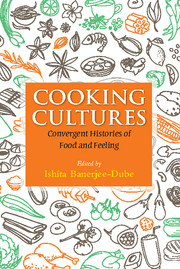Book contents
- Frontmatter
- Contents
- Acknowledgements
- Introduction: Culinary Cultures and Convergent Histories
- Part I Food, Pride, Power
- Part II Cooking, Cuisine, Gender
- Part III Food, Identity, Personhood
- Part IV Food, Myth, Nostalgia
- 10 Ras el Hanout and Preserved Lemons: Memories, Markets and the Scent of Borrowed Traditions
- 11 Culinary Myths of the Mexican Nation
- Contributors
- Index
- References
11 - Culinary Myths of the Mexican Nation
from Part IV - Food, Myth, Nostalgia
Published online by Cambridge University Press: 05 July 2016
- Frontmatter
- Contents
- Acknowledgements
- Introduction: Culinary Cultures and Convergent Histories
- Part I Food, Pride, Power
- Part II Cooking, Cuisine, Gender
- Part III Food, Identity, Personhood
- Part IV Food, Myth, Nostalgia
- 10 Ras el Hanout and Preserved Lemons: Memories, Markets and the Scent of Borrowed Traditions
- 11 Culinary Myths of the Mexican Nation
- Contributors
- Index
- References
Summary
In November 2010, UNESCO granted Mexican cuisine heritage status, thereby underscoring the role of food as an indissoluble bond between the country's inhabitants. International recognition of how Mexican food has impacted consolidation of national identity is simply a way of legitimising an ancient and extensive tradition of stories and myths, which have over the past 200 years forged the image of a cuisine that is authentic, unique and representative of the entire national territory. The idea of a culinary culture with ancient roots – which dates from pre-Hispanic times – that has harmoniously integrated two great civilisations of the Iberian and the Aztec – has validated during the last 200 years the originality and prestige of Mexican cuisine.
This work questions the principles of symmetry, continuity and homogeneity that characterise one of the favoured manifestations of the Mexican nation: its national cuisine. Our purpose is to restore the voices of those historical subjects who were excluded from the story of Mexican cuisine. For this we address the myth of the foundation of Mexico-Tenochtitlán and that of the first meeting between Moctezuma and Cortés, two stories originally recorded at the start of the sixteenth century, which were appropriated and reinterpreted for nationalist discourse.
Mexican cuisine: A flavoured metaphor of nationalism
The crisis of the Spanish monarchy, starting in 1808, gave rise to independence riots in various American colonies. In September 1810, the inhabitants of New Spain began their rebellion against the Spanish authorities, which concluded 11 years later, with the victory of the Mexican army. Creoles, descendants of Spaniards who were born in America, occupied the positions of power and the upper strata of the social hierarchy. Installed in their new position, the new elites were then given to the double task of erecting the foundations of the Mexican State and to write the history of the new nation. The colonial tensions and contradictions were erased off the national narrative (for example, the identification of most of Creoles, or ‘American Spanish’, with the Spanish monarchy), which meant creating a conciliatory interpretation of the Conquest and an idyllic view of pre-Hispanic past.
The national discourse linked directly the Mexican society with a remote and only origin. The origins of mexicanidad, Mexican-ness, were then identified with the Aztec past (also known as ‘ancient Mexicans’ during the nineteenth century), the most powerful Mesoamerican civilisation before the arrival of Spaniards, in the sixteenth century.
- Type
- Chapter
- Information
- Cooking CulturesConvergent Histories of Food and Feeling, pp. 224 - 246Publisher: Cambridge University PressPrint publication year: 2016
References
- 1
- Cited by



